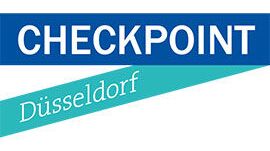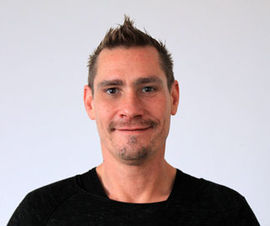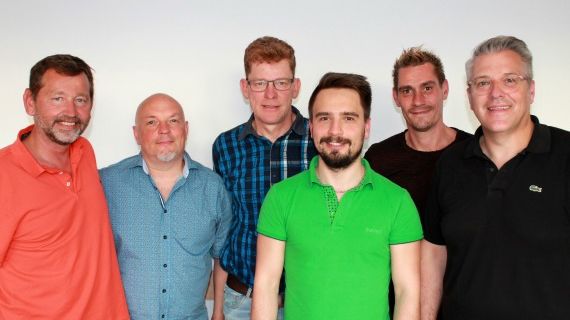Our advisors are happy to advise and help you with all your questions regarding HIV and Aids. Please do not hesitate to contact us.
Additional information
Checkpoint Düsseldorf
In connection with the HIV screening test, many questions arise. If you do not find the answers to your questions or are not satisfied with the answers provided, do not hesitate to contact us. We will be glad to assist.
- Why should have myself tested for HIV?
The general rule is: The sooner an HIV infection is detected and treated, the better. An early detected infection offers the best treatment options. An unrecognized and untreated HIV infection means: progressive destruction of the immune system, serious illnesses, loss of life. The current antiretroviral therapy can no longer completely compensate for this lost time. It is therefore important to be informed about an HIV infection as early as possible - regardless of whether the focus is on the clarity after having a risk contact or preventing others from becoming infected with HIV.
It is generally recommended that routine tests be carried out once or twice a year - or after meeting high risk contacts. - When and where do the Tests take place at the Aidshilfe Düsseldorf?
The tests take place every Tuesday from 7 - 9 pm at the Aidshilfe Düsseldorf. There are no tests on public holidays (see also the announcements on our landing page). - How does Aidshilfe Düsseldorf ensure my anonymity?
The client receives a letter code at the reception desk of the Aidshilfe Düsseldorf on the first floor. This code is used for the course of the evening as a "name". This ensures anonymity. - Do I have to complete a questionnaire and what does it serve for?
Within the framework of a nationwide project, together with the Robert Koch Institute and the German AIDS-Hilfe, a number of data are collected in order for adaption to the offers of the various test projects to the needs of the target group. Of course, the questionnaire is strictly anonymous. The completion is voluntary. - How exactly does the test at Aidshilfe Düsseldorf work?
Upon arrival at the Aidshilfe Düsseldorf reception, every client receives a letter code that ensures anonymity. In our loft café there are drinks and magazines. Then a consultant picks up the visitor with the respective letter code. In a joint discussion, it is decided which tests or test procedures make sense. The client then goes to the doctor, who then takes a blood sample - either from the fingertip or from the vein in the arm (if several tests or laboratory tests were selected).
In an HIV test (rapid test), the result is ready after about 30 minutes and this is communicated to the client by a consultant. If the test is non-reactive (ie, negative), there is no HIV infection and the visit is over. If the rapid test is reactive, ie, has reacted positively to antibodies in the blood, blood must be taken again, because the reactive rapid test result must always be confirmed by a second test in the laboratory.
If laboratory tests are carried out, the visit ends after taking the blood. During the consultation a date for receiving the results is agreed upon. The results can be requested by phone after one to two days. Written results are not published for a Variety of reasons.
For questions, our consultants, the doctor and the staff at the reception are available. If further questions arise at a later date, the counseling telephone of the Aidshilfe Düsseldorf can be reached from 10am to 1pm and from 2pm to 5pm at 0211-19411. - Do I need an appointment if I want to take a test at the Aidshilfe Düsseldorf?
No, an appointment is not necessary. All you have to do is drop by between 7pm and 9pm. However, we ask for your understanding that waiting times can not always be avoided. Please come knowing that - depending on how many clients may show up - a one to two hours waiting time is unavoidable. Drinks and reading material are provided for free. - Who carries out the test?
The blood sample and the quick test itself will be performed by a doctor. Our consultants are always available. - How long do I have to wait after a high risk contact, before I can test myself (= diagnostic window)?
Until the reactive / HIV positive result of a test is truly reliable, it must be six weeks after the high risk contact has taken place. Why? If you come in contact with pathogens such as HIV viruses, the immune system fights the pathogens and forms so-called antibodies. With a test, these antibodies can be detected. However, the body needs a certain amount of time to develop these antibodies. In HIV, these are the six weeks mentioned. This time span is called a "diagnostic window". It is the period between infection and the time from which the disease can be reliably detected by a test. - Why is a consultation part of the test offer and do I have to accept it?
As a rule, we ask you to take part in a consultation, because it serves to clarify open questions and determine whether or which test at the time of the visit is at all correct and meaningful. If after a high risk contact, for example, not enough time has passed to make a definitive statement, we may ask you to come back later. - Which tests are offered and what do they cost?
Aidshilfe Düsseldorf is currently offering HIV rapid and laboratory tests free of charge. All further tests are subject to feesand which serve to cover our expenses. - What is the difference between a rapid HIV test and a conventional HIV test?
Both tests are HIV antibody and p24 antigen tests. However, the result of a rapid test is faster (30 - 60 minutes) than that of a conventional HIV test (up to 10 days). In addition, the blood test in the rapid test is drawn from the fingertip, and not from the vein of the arm. If, however, a reactive (positive) result is displayed during the rapid test, another test (laboratory test) must be carried out. Only if this is also positive, then this can be confirmed as a HIV-positive result. - Why is the quick test fast? And: Is the quick test safe?
"Fast" in this case means that the test result is faster, usually after about 30 minutes. But also with the rapid test after a high risk contact a certain time (six weeks) must have passed (= diagnostic window, see above), before one receives a concrete result. The HIV rapid test is just as safe as the conventional lab test. If the six-week waiting period for a high risk contact has been met and the result is negative (ie no HIV virus detected), then you can be confident that you are not infected with HIV.
In very rare cases, it can happen that a quick test indicates a false positive result. For this reason, the result in this case is called "reactive" for the time being. Only when a second test in the laboratory confirms the reactive result, one speaks of an HIV-positive result and an HIV infection is present.
Further information on our website www.duesseldorf.aidshilfe.de or via our consultation telephone 0211 - 19411
The Checkpoint Düsseldorf project is kindly supported by Deutschen AIDS-Hilfe, Deutschen AIDS-Stiftung, GlücksSpirale and the MAC Aids Fund. Thanks also to Mercedes Benz Düsseldorf who is also supporting our Checkpoint offer.


Marco Grober (he/him)
Prevention for men who have sex with men
Gay assault hotline
Project Coordinator Checkpoint Düsseldorf
Tel.: 0211 - 77 095-30

Team Checkpoint Düsseldorf
From left to right: Dr. med. Bernd Schumacher-Adams, Frank Bufler (Project Coordinator Checkpoint Düsseldorf), Dr. med. Robert Baumann, Dr. Alexander Baum, Marco Grober (Project Coordinator Checkpoint Düsseldorf), Dr. med. Andreas Pelzer
© Aidshilfe Düsseldorf
